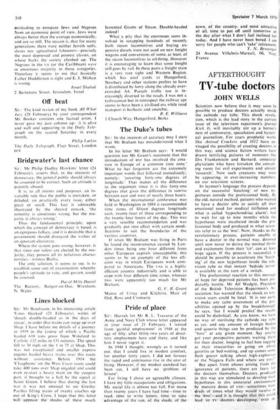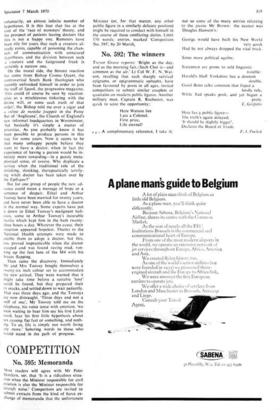AFTERTHOUGHT
TV-tube doctors
JOHN WELLS
Scientists now believe that it may soon be possible to produce doctors actually inside the cathode ray tube. This shock revela- tion, which is the lead story in the current issue of the television repairmen's journal Kick II, will inevitably stir up a hornet's nest of controversy, speculation and hysteri- cal journalism. For years prophetic works like Animal Crackers and 1812 have en- visaged the possibility of creating doctors in this way, and science fiction writers have drawn terrifying pictures of monsters like Drs Frankenstein and Barnard, unnatural physicians who have forsaken the consult- ing room for evil experiments and sinister 'research'. Now such creatures may soon be appearing, in ever-increasing numbers, on our television screens.
In layman's language the process depends on the successful 'hatching' of new hy- potheses outside the professional body. By the old, natural method, patients who wanted to have a doctor able to satisfy all their emotional need for medical titillation and what is called 'hypochondriac alarm', had to wait for up to nine months while the hypotheses were incubated inside the pro- fessional body and produced in what scient- ists refer to as the 'Eno'. Now, thanks to the revolutionary process, patients unable to have a doctor in the normal way, doomed until now never to derive the normal thrills and excitement from their 'GP', can at least hope again. If the process is successful. it should be possible to accelerate the 'hatch- ing' of the new hypotheses inside the tele- vision tube so that instant 'bedside terror' is available at the turn of a switch.
The professional reaction to this message of hope for deprived patients has been pre- dictably hostile. Mr Alf Wedgitt, President of the British Television Repairmen's As- sociation, has warned that the shock to tele- vision users could be fatal. 'It is too early to make any calm assessment of the pos- sibilities opened up by the breakthrough' he says, 'but I would predict- the results could be diabolical. As you know, we have no way of sterilising the cathode ray tube as yet, and any amount of foreign bodies and queerie things can be produced by the "host" at any given moment. Say you've got your prospective patients waiting there
for their doctor, longing to feel him tugging
at their insecurities or going on about gastritis or bed-wetting, and up comes some
flash geezer talking about high-explosive` or the Niagara Falls and where are you? But apart from abuses arising from the ignorance of patients, there are fears for the doctors themselves. Doctors produced in this way are stimulated to -develop their hypotheses in this unnatural environment by massive doses of Lsick—sometimes hun- dreds of times what they would receive in
the 'Braf—and it is thought that this could lead to Tv doctors developing, even 111- voluntarily, an almost infinite number of hypotheses. It is this fear that lies at the root of the 'race of monsters' theory, and the prospect of patients having doctors like this is not a happy one. Rumours have been rife for years that such a creature al- ready exists, capable of poisoning the chan- nels of communication with unnatural hypotheses, and the division between such a creature and the fairground freak is certainly a narrow one.
On the moral side, the fiercest reaction has come from Bishop Cosmo Quant, the controversial South Bank theologian who recently unfrocked himself in order to join the staff of Spank, the progressive magazine. This could of course be seen by reaction- aries as a mischievous tinkering with the divine will, or some such trash of that order', the Bishop told me over a cigar and a creme de menthe frappie in the Pussy Bar of 'Anglicana', the Church of England's new informal headquarters in Westminster, 'but basically it's simply a matter of priorities. As you probably know it has been possible to produce parsons in this way for some years. Now it seems to be that many unhappy people believe they want to have a doctor, when in fact the experience of having a parson would be in- finitely more rewarding—in a purely meta- phorical sense, of course. Why duplicate a service when the traditional role of the shrieking, shocking, therapeutically terrify- ing witch doctor has been taken over by the Epilogue?'
But for one group of people the new ad- vance could mean a message of hope or a sentence of despair. Ethel and Arthur Toovey have been married for twenty years, and have never been able to have a doctor in the normal way. Some experts have put it down to Ethel Toovey's malignant hali- tosis, some to Arthur Toovey's incurable inertia which kept him in the bath twenty- three hours a day. Whatever the cause, their situation appeared hopeless. Thanks to the National Health attempts were made to enable them to adopt a doctor, but this, too, proved impracticable when the doctor escaped and was found raving mad, run- ning up the fast lane of the M4 with his braces flapping.
Then came the discovery. Immediately Mr and Mrs Toovey bought themselves a twenty-six inch colour set to accommodate the new arrival. They were warned that it might take time before a suitable 'host' could be found, but they prepared their Tv snacks, and settled down to wait patiently. That was three days ago, and the Tooveys are now distraught. 'Three days and not a sniff of one', Mr Toovey told me on the telephone, his voice tense with emotion, 'we were waiting to hear him say his first Latin word, hear his first little hypothesis about sex causing flat feet or something, and noth- ing. To us, life is simply not worth living any more.' Sobering words to those who would stand in the path of progress.



































 Previous page
Previous page